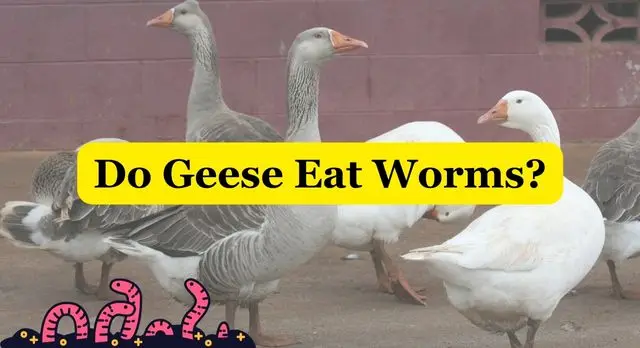Do Geese Eat Worms? Exploring the Relationship
Geese are fascinating creatures that many of us encounter in our daily lives, whether at the park or near a pond. These feathered friends are known for their distinctive honking and graceful flight. But have you ever wondered, “Do geese eat worms?” In this article, we’re going to explore the eating habits of geese and discover whether worms are on their menu.

Do Geese Eat Worms? The Facts Unveiled
Yes, geese eat worms such as earthworms, mealworm, grub worms and army worms, but they are not a primary part of their diet. Geese are opportunistic feeders, which means they will eat a wide variety of food if it’s readily available. Worms, insects, and small aquatic creatures can be on the menu, especially for young goslings, as they provide essential proteins for growth.
When Geese Eat Worms?
Geese may eat worms opportunistically when they come across them while foraging for other food. This behavior is more common in Canada geese and domesticated geese. Wild geese are more likely to focus on their preferred plant-based diet.
Can Geese Digest Worms?
Geese have specialized digestive systems designed for processing plant material. While they can consume small insects and worms, their digestive tract is not optimized for digesting large quantities of animal matter. This means that if a goose eats a worm, it’s likely to pass through their system relatively unchanged.?
Can baby geese eat worms?
Baby geese, known as goslings, have a diet primarily consisting of vegetation. While they may consume worms incidentally, their diet mainly consists of grass, leaves, and other plant material. As goslings grow, their diet gradually shifts to mimic that of adult geese.
Do Geese Benefit from Eating Worms?
While geese may occasionally nibble on worms, they don’t derive significant nutritional benefits from them. Their bodies are better adapted to extract nutrients from plants and grains. So, even if they do consume worms, it’s not a crucial part of their diet.
What are the Symptoms of Worms in Geese?
When geese have worms, you might notice some signs that show they’re not feeling well. These signs can include:
- Tummy Troubles: Geese with worms might have stomach problems like diarrhea, which means they have runny poop.
- Weight Loss: Sometimes, they can lose weight and look thinner than usual because the worms are taking away their food.
- Feathers Not So Good: Their feathers might not be as shiny or healthy-looking as they should be.
- Lethargy: Geese with worms might seem tired or not as active as they usually are.
- Eating Less: They might not eat as much as they usually do, or they might stop eating altogether.
If you see your geese showing these signs, it’s important to take them to the vet or someone who knows about geese to get them checked and treated. Worms can make geese sick, so it’s essential to help them feel better.
How to Get Rid of Worms in a Goose?
Sometimes, geese can get worms inside their bodies, and it’s not good for them. To help them, you can follow these steps:
- Medicine: You’ll need to give the goose special medicine that can get rid of the worms. This medicine can be in the form of a pill or liquid.
- Ask a vet: It’s a good idea to ask a veterinarian for help. They are experts who know which medicine to use and how much to give to the goose.
- Follow Instructions: The vet will tell you how often to give the medicine and for how long. It’s important to follow their instructions carefully.
- Clean Living Space: Make sure the place where the geese live is clean. This can help prevent them from getting worms again.
- Healthy Diet: Give your geese a healthy diet with the right food. This can also help keep them worm-free.
Remember, it’s essential to take good care of your geese and keep them healthy, and deworming them when needed is part of that care.
Conclusion
Geese usually eat plants, like grass and water plants. But sometimes, when they’re eating in grassy places or wetlands, geese might accidentally eat a few worms. But these worms are just a tiny part of their food. Most of the stuff they eat is plants. Geese are important in nature because they help keep the environment balanced by eating plants. So, even though they might snack on worms once in a while, they really depend on plants to stay healthy.
FAQs
How often can geese eat worms?
Geese can eat worms incidentally while foraging for vegetation. However, worms make up only a small part of their diet. Geese primarily rely on plant material as their main source of food, and the consumption of worms occurs when they are present in the grass or soil where geese are feeding.
Do geese eat grub worms?
Grub worms, which are the larvae of certain beetles, are not a significant part of a goose’s diet. Geese are primarily herbivorous and prefer to consume grasses, aquatic plants, and other vegetation. While geese may encounter grub worms in the soil while foraging, they do not actively seek them out as a food source.
Do geese eat mealworms?
Mealworms, which are the larvae of darkling beetles, are not a natural part of a goose’s diet. Geese are herbivores and mainly feed on grasses, leaves, and aquatic plants. While geese may consume mealworms if they come across them, their diet primarily consists of plant material rather than insects.
Can a goose eat army worms?
Armyworms are caterpillars that can be destructive to crops and vegetation. While geese may consume armyworms if they encounter them while foraging, their diet primarily focuses on grasses, leaves, and other plant material. Geese are not considered a primary predator of armyworms, and their consumption of these pests is incidental rather than intentional.
Related Guide
